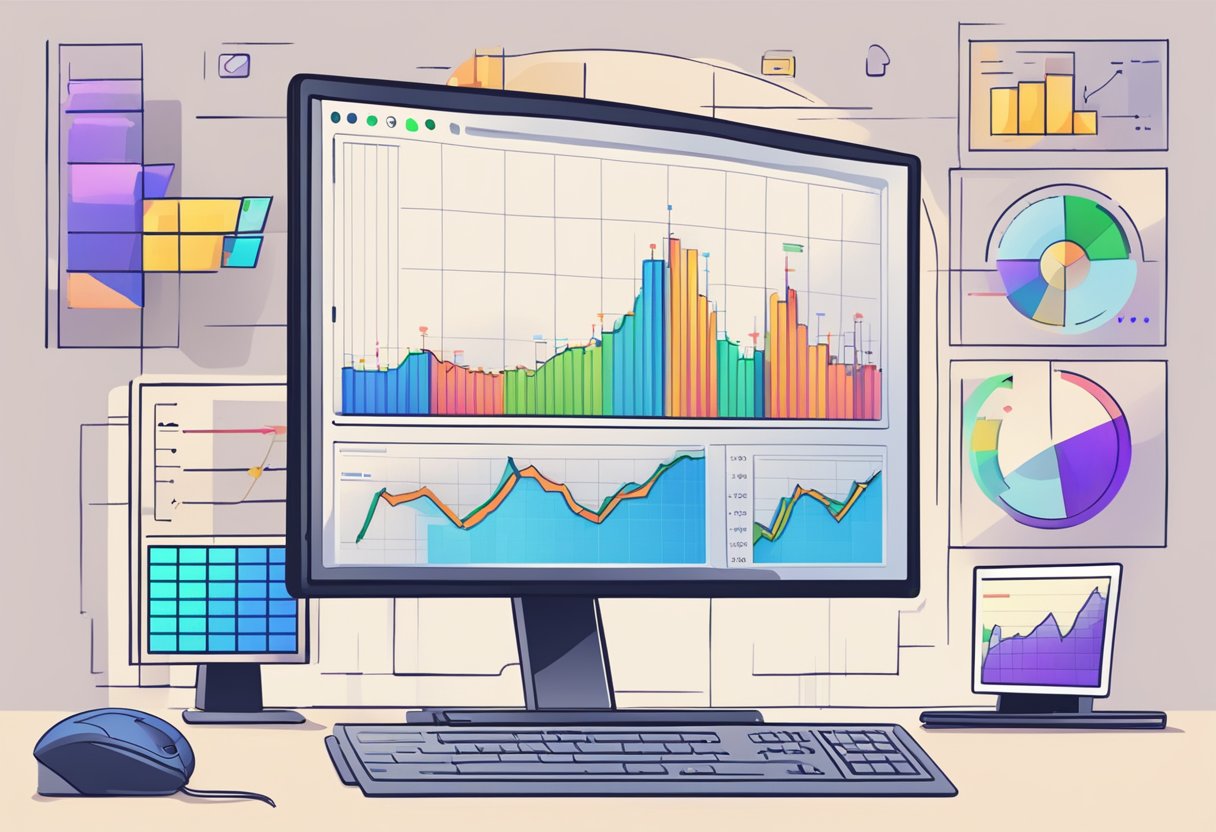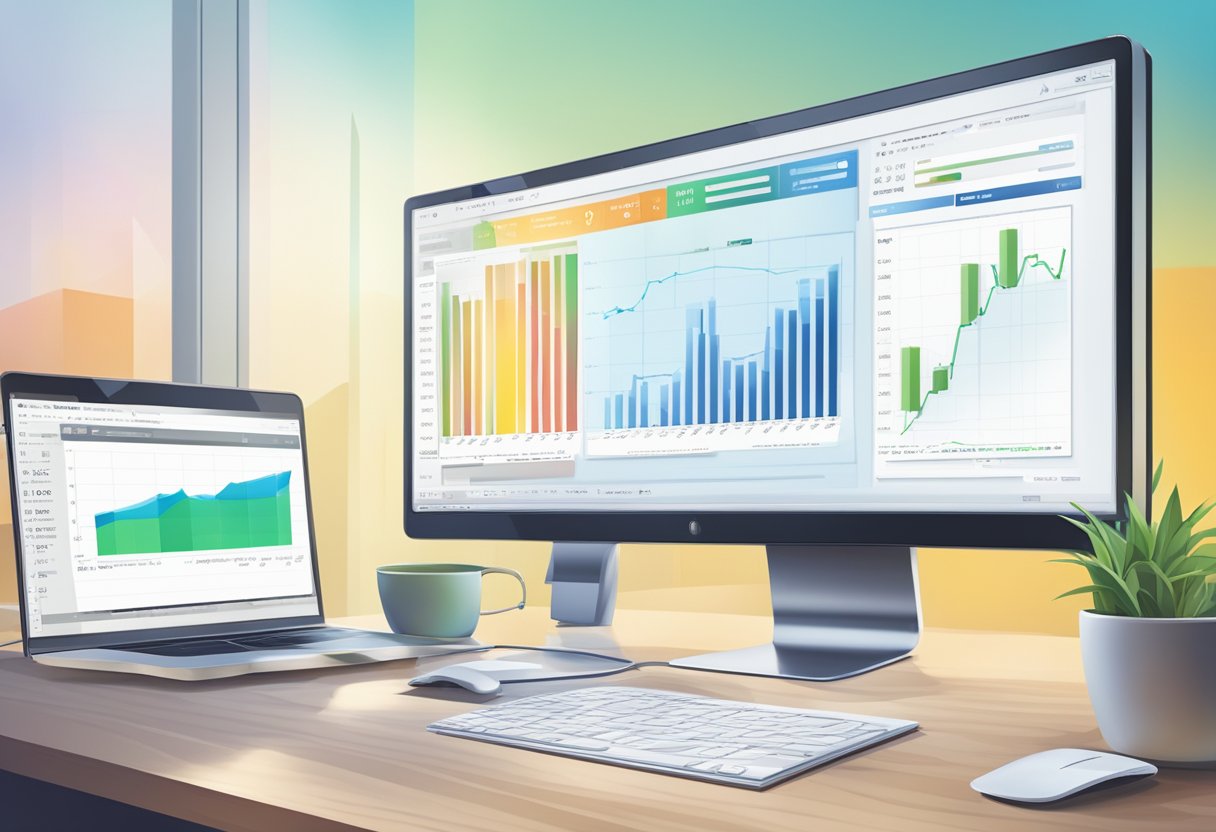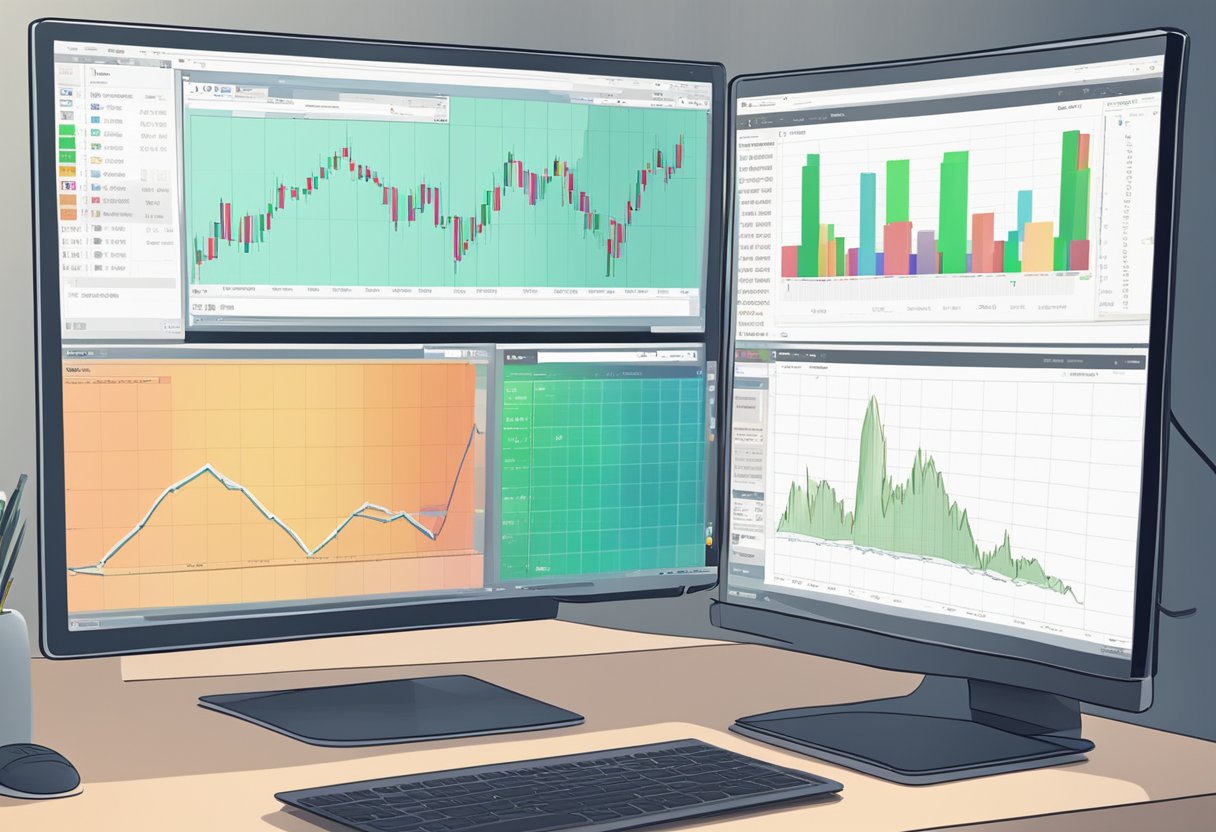Starting to trade in the financial markets can be an exciting yet challenging endeavor for beginners. To be successful, it’s crucial to have a solid understanding of the basics of trading, various investment options, and how to choose the right platform for your needs. As a beginner, you should take the time to thoroughly research and learn about the necessary steps to take before placing your first trade.

One essential aspect to consider is knowing your investment goals and risk tolerance. This will help you decide which investment options to explore and how much money to allocate to your trades. Additionally, setting up your trading account properly and developing your trading skills will be crucial to managing your risks and maximizing your potential returns in the market.
Remember, trading involves risks, and it’s important to budget and finance accordingly while continuing your trading education to stay up-to-date with market trends and strategies. Diversification and risk management techniques can also help mitigate potential losses and ensure a successful and long-lasting trading experience.
Key Takeaways
- Understanding trading fundamentals and selecting a suitable platform is crucial to success
- Setting clear investment goals and learning to manage risks are essential in trading
- Continuously improving trading skills and staying informed about market trends can lead to better results in the long run
Understanding Basics of Trading
Trading is an activity in which individuals and institutions buy and sell financial instruments, such as stocks, to profit from price changes in the stock market. It involves speculating the market price movement of underlying assets such as equities, commodities, and currencies. The primary goal is to capitalize on short-term price fluctuations and generate returns.
Investors enter the market by purchasing company shares, equities or securities. These shares represent partial ownership in the company, and as the company’s value increases or decreases, so does the value of the claims. Traders buy and sell these shares within the market, hoping to profit from the price difference, also known as capital gains. Understanding the basics of trading is crucial for beginners who want to start investing in financial markets.
The stock market serves as a platform for connecting buyers and sellers of shares, allowing them to trade with each other. This is facilitated by different exchanges like the New York Stock Exchange (NYSE) or the NASDAQ. Trading can be done through various methods, such as day trading, swing trading, and long-term investing, depending on the individual’s goals and risk tolerance.
Before beginning to trade, a beginner should open a trading account with a reputable broker. These brokers provide access to various trading platforms, such as MetaTrader 4 (MT4), that allow investors to execute trades, monitor their investments, and analyze market trends. They also serve as intermediaries between buyers and sellers, ensuring that trade orders are run smoothly and efficiently.
Diversification is another crucial aspect of trading. By investing in various financial instruments, such as stocks, bonds, and currencies, a trader can reduce the overall risk of their portfolio. Diversification allows investors to spread their capital across various markets, minimizing the potential impact of a single poor-performing investment.
Finally, successful trading requires discipline, patience, and continuous learning. Traders should be prepared to adapt their strategies to evolving market conditions and stay informed about economic and financial news. By understanding the basic principles of trading and maintaining a precise, knowledgeable, and confident approach, beginners can increase their chances of success in the trading world.
Choosing the Right Platform
Evaluating Online Brokers
When you’re starting to trade, it’s crucial to choose the right online broker. Well-known brokers, such as TD Ameritrade, Charles Schwab, and Fidelity, offer user-friendly platforms tailored for beginners. Take time to compare the features of various online stock brokers and consider factors such as ease of use, available resources, and fees.
It’s essential to assess the range of investment products and markets a brokerage offers to ensure it meets your trading goals. Look at available research tools and educational materials that can help guide your investment decisions. Moreover, don’t underestimate the value of a brokerage’s customer support, as having access to knowledgeable support can be vital for beginners navigating the complexities of the trading world.
Understanding Robo-Advisors
Another option for beginners in trading is using robo-advisors. Robo-advisors are automated investing platforms that create and manage a diversified portfolio based on your investment preferences and risk tolerance. They typically charge lower fees than traditional brokerage accounts, making them an attractive choice for those with limited funds or looking for a hands-off approach to investing.
If choosing to use a robo-advisor, evaluate their offerings similar to how you would assess an online broker. Consider factors such as fees, investment options, and the level of customization you want in your portfolio. While robo-advisors typically have limited customer support, verifying whether they provide adequate assistance if you encounter any issues or have questions about your investments is essential.
By taking the time to research and evaluate the available options, you can make an informed decision when selecting the right trading platform and take your first step toward a successful trading experience.
Knowing Your Investment Goals
Identifying your investment goals is a crucial first step toward successful trading. By setting clear objectives, you can tailor your strategies to achieve your desired long-term or short-term gains.
Long-term investment goals typically focus on building wealth over an extended period, such as saving for retirement or funding a child’s education. Short-term goals, on the other hand, might include saving for a vacation, buying a car, or creating an emergency fund. Both long-term and short-term goals play a crucial role in your financial planning, so it’s essential to strike a balance between the two.
Your time horizon refers to the time before you need the funds from your investments. A longer time horizon usually allows for a more aggressive investment strategy, as you have more time to recover from potential market downturns. On the other hand, a shorter time horizon might require more conservative investments to ensure you can access your funds when needed without taking on too much risk.
Risk tolerance is an essential factor to consider when determining your investment goals. Everyone has a unique level of comfort with risk, and it’s crucial to understand your risk tolerance before diving into the world of trading. Some investors may be more aggressive, with a higher risk tolerance, while others may be more cautious and prefer low-risk investments. By understanding your risk tolerance, you can make informed decisions about which investments suit your portfolio and align them with your time horizon and investment goals.
Retirement planning is a common long-term investment goal that merits special attention. Planning for retirement typically involves investing in diverse assets, such as stocks, bonds, and mutual funds, to accumulate enough wealth that allows for a comfortable lifestyle in the later years of life. Balancing risk, time horizon, and investment goals in the context of retirement planning is a crucial skill for any investor.
In conclusion, knowing your investment goals is the foundation of successful trading. By understanding the distinctions between long-term and short-term goals, identifying your time horizon, and assessing your risk tolerance, you can develop strategies and choose suitable investments that align with your financial objectives.
Exploring Investment Options
When starting on your investment journey, it is vital to understand the various types of investments available to you. By exploring different options, you can make informed decisions that align with your financial goals and risk tolerance. This section will discuss the basics of stocks and shares, ETFs and mutual funds, and bonds.
About Stocks and Shares
Stocks, also known as shares, represent a tiny ownership stake in a company. Owning stocks gives you certain rights, such as voting in shareholder meetings and receiving dividends if the company decides to distribute its profits. Stocks can offer potentially high returns but also come with risks, as the market value of the shares can fluctuate significantly. Some investors focus on established companies called blue-chip stocks, while others search for emerging growth stocks. Stocks can be included in retirement accounts like IRAs and 401(k)s, which usually offer tax advantages.
Understanding ETFs & Mutual Funds
Exchange-traded funds (ETFs) and mutual funds are investment vehicles that pool money from multiple investors to buy a diversified portfolio of assets, such as stocks, bonds, or other securities. Some ETFs and mutual funds are actively managed, meaning a portfolio manager decides which stocks to buy and sell. In contrast, others are passively managed and designed to track a specific index or benchmark. Both ETFs and mutual funds offer diversification and professional management, making them a popular choice for investors seeking growth and lower risk than owning individual stocks. These funds can also be included in retirement plans like IRAs and 401(k)s.
Getting Familiar with Bonds
Bonds are debt securities governments, corporations, or other entities issued to raise capital. When you buy a bond, you essentially lend money to the issuer, which they agree to pay back with interest over a predetermined period. While bonds generally offer lower returns compared to stocks, they provide a steady income stream and more predictability.
There are various types of bonds, including:
- Government bonds: Issued by governments, these bonds are considered low-risk investments and backed by the issuing country’s credit.
- Corporate bonds: Issued by large companies to fund their operations, these bonds typically offer higher yields than government bonds but carry higher risks.
- Municipal bonds: Issued by state or local governments, these bonds are popular among investors for their tax-exempt interest income.
In conclusion, exploring the range of investment options and understanding their varying features, risks, and potential rewards can help you build a well-balanced, diversified portfolio that suits your financial goals and risk tolerance.
Setting Up Your Trading Account

Setting up a trading account is an essential step for anyone looking to enter the investing world. This section will guide selecting a suitable brokerage account, focusing on retirement account options.
Opening a Brokerage Account
Before you can begin trading, you’ll need to open a brokerage account. This type of account allows you to buy and sell various financial instruments, such as stocks, bonds, and mutual funds. Choosing a reputable and secure broker to safeguard your investments is essential.
When selecting a broker, consider fees, trading platforms, customer service, and research tools. Compare several brokers to find the best fit for your needs. Once you’ve chosen a broker, you can sign up for a taxable brokerage account and fund it using cash, checks, or electronic transfers.
Setting Up a Retirement Account
In addition to a regular brokerage account, many investors open an Individual Retirement Account (IRA) for long-term, tax-advantaged investing. There are generally two types of IRAs: Traditional and Roth. Both can provide significant tax benefits, but they differ in eligibility, contribution limits, and withdrawal rules.
- Traditional IRA: Pre-tax contributions allow for tax-deferred growth, but withdrawals are taxed as ordinary income upon retirement. There is no income limit for contributing to a Traditional IRA, but there are restrictions on tax deductions based on income and access to a workplace retirement plan.
- Roth IRA: Contributions are made with after-tax dollars, so qualified withdrawals in retirement are tax-free. However, income limits exist for eligibility to contribute to a Roth IRA.
Consider your investment goals, age, and income when setting up a retirement account. It’s essential to research and understand the differences between a Traditional and a Roth IRA before deciding on the best option for your needs. Once you’ve established your retirement account, diversify your investments to minimize risk and maximize potential returns.
In conclusion, setting up a trading account is crucial to achieving financial security. Carefully select a brokerage and retirement account to ensure you can confidently navigate the investing world.
Budgeting and Financing

Before starting to trade, having a solid financial foundation is crucial. This includes understanding your money management, creating a budget, and setting aside an emergency fund. Proper budgeting and financing play a significant role in becoming a successful trader and ensuring long-term financial stability.
A well-planned budget allows you to track your monthly income and expenses, helping you prioritize financial goals like trading. The 50/30/20 rule is a popular budgeting framework that helps allocate your funds. It suggests giving 50% of your income towards necessities, such as rent and groceries, 30% towards wants, and 20% towards savings and debt repayment. This plan helps create a clear roadmap for trading while maintaining a balanced lifestyle.
When entering the trading world, it is essential to acknowledge the inherent risks involved. An emergency fund is a financial buffer during tough times, such as unexpected market shifts or personal financial crises. Experts recommend having at least three to six months’ worth of living expenses saved in an easily accessible account before you begin trading. This fund ensures you can manage unforeseen circumstances without depleting your trading capital.
Before you commence trading, evaluate your current financial situation and determine how much you can invest. It is advised only to invest money that you can afford to lose. Be realistic with your expectations and avoid taking excessive risks to pursue high returns.
Understanding the importance of budgeting and financing is key to successful trading. By managing your money, creating a budget, and setting up an emergency fund, you will foster a solid financial foundation and increase your chances of trading success.
Developing Trading Skills

Using Trading Tools
Traders aiming for success in the financial market, whether the stock market, forex, or any other market, require various trading tools to enhance their trading skills. These tools help in improving decision-making and overall trading performance. Common trading tools include charting software, economic calendars, and technical indicators. Charting software lets traders visualize market data and identify potential trends or patterns. Economic calendars provide traders crucial information about upcoming market events that could impact the financial markets. Meanwhile, technical indicators serve as essential tools for evaluating market conditions and identifying potential trade signals.
Practicing with Virtual Trading
One of the most effective ways for beginners to develop trading skills is by practicing paper trading or a stock market simulator. Paper trading allows individuals to simulate real-life trading experiences without risking natural capital. This is achieved by opening a virtual trading account replicating the actual trading environment, including real-time market data, trading tools, and order types. By practicing virtual trading, traders can refine their strategies, learn about market dynamics, and gain confidence in their abilities before transitioning to live trading.
Through consistent practice and using trading tools, individuals can gradually enhance their trading skills, thus increasing the likelihood of success in various markets, such as forex, day trading, or trading stocks. It’s essential to remember that developing trading skills is a continuous process that requires dedication, patience, and a commitment to improvement.
Risk Management and Diversification

Risk management is essential to trading, as it allows traders to minimize potential losses and protect their investments. One of the primary techniques used for risk management in trading is diversification. By diversifying their portfolio, traders can spread the risk across various asset types, reducing the overall portfolio volatility and susceptibility to market fluctuations.
Diversification involves allocating investments into different asset classes, such as stocks, bonds, and commodities, and diversifying within each asset class. This approach ensures that no single investment or market event disproportionately impacts the overall portfolio performance. A well-diversified portfolio is more likely to withstand financial market downturns and provide more stable returns.
Investing in different sectors and industries is an essential aspect of diversification within each asset class. For instance, investing in stocks from technology, healthcare, and financial sectors ensures that the portfolio is not overly concentrated in any single industry. This strategy helps prevent significant losses if one sector experiences a downturn due to specific market events.
When building a diversified portfolio, it is crucial to consider the correlation between different asset classes and investments. Assets with low or negative correlations tend to perform differently under varying market conditions, reducing overall portfolio volatility. For example, investments in different geographical regions can further enhance diversification, as markets in the various areas may respond differently to global economic events.
In conclusion, proper risk management and diversification help traders protect their investments by reducing exposure to adverse market movements and enhancing the stability of returns. A carefully built diversified portfolio can help navigate market volatility and generate more consistent profits, ultimately leading to better long-term results for investors.
Continuing Trading Education

Participating in Seminars
Attending trading seminars can be an effective way to expand one’s knowledge and skills in the trading world. These events often feature experienced traders and experts sharing their insights, strategies, and success stories. By participating in these seminars, individuals can gain valuable firsthand information, learn from the experiences of successful traders, and network with like-minded individuals.
Some well-known financial organizations and brokerage firms offer seminars to their clients, often for free or at a reasonable cost. These events may be in-person or conducted through online webinars, making them accessible to people worldwide. It is essential to research the credibility of the speakers and the organizations hosting the seminars to ensure the information provided is accurate and valuable.
Utilizing Educational Resources
In addition to seminars, many educational resources are available to traders that can contribute to their ongoing education. Some of these resources include:
- Online courses: Platforms like Investopedia and WallStreetZen offer comprehensive courses for beginners and experienced traders. These courses often cover various topics, such as technical analysis, risk management, and trading strategies.
- Books: Many books offer in-depth information about trading, written by experienced traders and financial experts. Reading both classic and contemporary literature on trading can help build a solid foundation and understanding of the market.
- Trading platforms: Some trading platforms, like MetaTrader 4 (MT4), provide educational resources, such as articles, tutorials, videos, and webinars that cover various aspects of trading.
- Mentorship programs: Partnering with an experienced trader or joining a trading community can provide essential guidance, support, and valuable insights as you progress in your trading journey.
Building a successful trading career requires a commitment to continuous education. By participating in seminars and utilizing various educational resources, traders can consistently enhance their skills, stay up-to-date with market trends, and ultimately make more informed decisions.
Conclusion

Becoming a successful trader requires dedication, persistence, and continuous learning. Developing a solid strategy based on proven principles, such as those practiced by experts like Warren Buffett, can be essential in achieving financial success.
Remaining patient and adapting your strategy as you progress is crucial. Learning to analyze market trends, being disciplined in your investments, and staying up-to-date on the latest market news will help you build a strong foundation in trading.
Educating yourself on the best practices, researching potential investments, and consistently refining and revising your approach will be invaluable as you embark on your trading journey. By doing so, you’ll develop a more in-depth understanding of market behavior and trends, ultimately enabling you to make more informed decisions.
In conclusion, with determination, continuous learning, and the guidance of successful traders like Warren Buffett, you’ll be well on your way to achieving financial success. Just remember that the road to becoming a proficient trader may be long and challenging, but with the right mindset, dedication, and discipline, it is indeed attainable.
Frequently Asked Questions

What are the essential steps for beginners in trading?
For beginners in trading, it’s crucial to learn the basics, including understanding financial markets, trading terminologies, financial instruments like stocks, bonds, and commodities, and fundamental and technical analysis. Developing a trading plan, setting a budget, and choosing a reliable trading platform or broker to execute trades is equally important.
Which trading platforms are suitable for beginners?
Several trading platforms are suitable for beginners, each with different features and tools. Some popular choices include ATFX and StocksToTrade. Researching and comparing various platforms is important to determine which one suits your needs best.
What is the minimum investment required for trading?
The minimum investment required for trading varies depending on the type of securities and the trading platform or broker. It’s essential to start with a budget within your financial means to minimize potential losses. Some platforms or brokers might have a minimum account balance or initial deposit requirement; research your preferred medium to understand their needs.
How can I develop a robust trading strategy?
Developing a solid trading strategy involves understanding your risk tolerance, financial goals, and preferred markets. Establishing clear entry and exit points, stop-loss levels, and profit targets is important. Study various approaches like trend-following, oscillators, and support-resistance techniques to find the strategy that suits your personality and trading goals. Practice your plan using a demo account before risking real money.
What resources can help you learn trading for free?
Numerous free resources are available to help learn to trade. Educational websites like Investopedia offer comprehensive articles and tutorials on trading basics, strategies, and techniques. Additionally, YouTube channels, podcasts, and free online courses can provide valuable insights into getting started and becoming a successful trader.
How important is risk management in trading?
Risk management is crucial in trading and can significantly differentiate between success and failure. Effective risk management involves consistently protecting your capital by controlling the size of positions, setting stop-loss orders, monitoring market conditions, and adjusting your strategy accordingly. Emphasizing risk management helps minimize losses and maximize profits in the long run.

Related Posts
- Bitcoin Market Cycles and You
- How to Trade Cryptocurrency – For Beginners
- The Basics of a 401(K) Retirement Plan
- 5 Ways GIG Economy Workers Can Save for Retirement
- 4 Things You Must Know When Retirement
THE BOTTOM LINE
Once you’ve mastered the basics of trading, you’ll be able to develop the next set of skills. The question at that stage is, ‘Where do I start?’
Just spending a few minutes booking trades on a demo account will probably have given you a glimpse of a lifetime’s worth of learning. The trick to profitable trading is knowing which skills to use and when to trade with discipline.
If your trading is going off-track, take a break and switch to demo trading. Losses are part and parcel of trading, but there is no need to incur self-inflicted hits on your profit and loss account.

If you have just 6 minutes a day …
…then that’s enough time to “copy & paste” my team’s trade suggestions that make it possible for you to go after an extra $4,076, $4,780 or even as much as $6,018 in just six minutes a day!
Watch my training video and prove to yourself how it can help you achieve your financial goals.

I look forward to working with you!
Sincerely,

Chuck Hughes
Creator of the Award-Winning
Hughes Optioneering®

The information provided by the newsletters, trading, training, and educational products related to various markets (collectively called the “Services”) is not customized or personalized to any particular risk profile or tolerance. Nor is the information published by Legacy Publishing, LLC (“Legacy”) a customized or personalized recommendation to buy, sell, hold, or invest in particular financial products. Past performance is not necessarily indicative of future results. Trading and investing involve substantial risk and is not appropriate for everyone. The actual profit results presented here may vary from those shown in other Legacy Publishing LLC publications due to the different strategies and time frames presented in other publications. Trading on margin carries a high level of risk and may not be suitable for all investors. Other than the refund policy detailed elsewhere, Legacy does not make any guarantee or other promise as to any results that may be obtained from using the Services. Legacy disclaims any liability for any investment or trading loss sustained by a subscriber. You should trade or invest only “risk capital” – money you can afford to lose. Trading stocks and stock options involve high risk, and you can lose the principal amount invested or more. There is no guarantee that systems, indicators, or trading signals will result in profits or that they will not produce losses.
Some profit examples are based on hypothetical or simulated trading. This means the trades are not actual trades but hypothetical trades based on real market prices at the time the recommendation is disseminated. No actual money is invested, nor are any trades executed. Hypothetical or simulated performance is not necessarily indicative of future results. Hypothetical performance results have many inherent limitations, some described below. Also, the theoretical results do not include the costs of subscriptions, commissions, or other fees. Because the trades underlying these examples have not been executed, the results may understate or overstate the impact of certain market factors, such as lack of liquidity. Legacy makes no representations or warranties that any account will or is likely to achieve profits similar to those shown. No representation is made that you will achieve profits or the same results as anyone providing a testimonial. No representation is being made that any person providing a testimonial is likely to continue to experience profitable trading after the date on which the testimonial was provided, and in fact, the person providing the testimonial may have subsequently experienced losses. The cost basis for some options in a portfolio may be reduced by rolling over profits at option expiration, which is one of the Hughes Optioneering Trade Management Rules. Some income figures represent the total option premiums collected during the referenced period. Actual profits were less. Open trade profit results may have increased or decreased when the trades were closed. Chuck Hughes‘ experiences are not typical. Chuck Hughes is an experienced investor. Your results will vary depending on risk tolerance, amount of risk capital utilized, size of trading position, willingness to follow the rules, and other factors.




